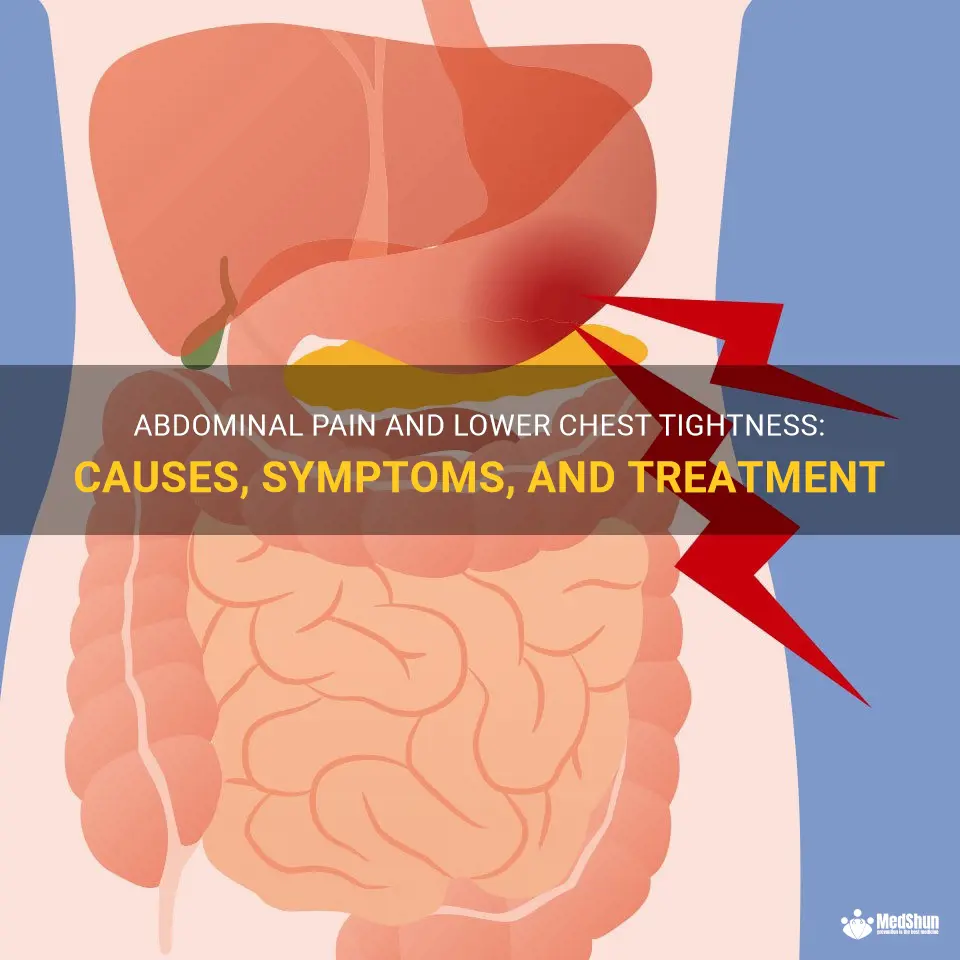
Abdominal pain and lower chest tightness can be alarming symptoms that may indicate underlying health issues. Whether it's a sharp, stabbing pain or discomfort that lingers, these sensations can disrupt daily life and cause worry. From gastrointestinal problems to cardiac conditions, the causes can range from benign to life-threatening. Understanding the potential causes and seeking appropriate medical attention is key to finding relief and maintaining overall well-being. In this article, we will explore the various causes of abdominal pain and lower chest tightness, their accompanying symptoms, and the necessary steps to take for proper diagnosis and treatment.
| Characteristics | Values |
|---|---|
| Location | Abdomen, lower chest |
| Type of pain | Sharp, dull, cramp-like |
| Severity | Mild, moderate, severe |
| Duration | Constant, intermittent |
| Radiation | None, to back, to shoulders |
| Onset | Sudden, gradual |
| Triggers | Eating, movement |
| Associated symptoms | Nausea, vomiting, bloating |
| Relieved by | Rest, antacids, passing gas |
| Worsened by | Movement, eating, deep breaths |
| Other related symptoms | Diarrhea, constipation, fever |
What You'll Learn
- What are some common causes of abdominal pain and lower chest tightness?
- Is this combination of symptoms always a cause for concern, or could it be something minor?
- What diagnostic tests or procedures might be used to determine the cause of abdominal pain and lower chest tightness?
- Are there any specific treatment options available for this combination of symptoms?
- Should I seek emergency medical attention if I am experiencing severe or persistent abdominal pain and lower chest tightness?

What are some common causes of abdominal pain and lower chest tightness?
Abdominal pain and lower chest tightness are common symptoms that can be caused by various underlying health conditions. In this article, we will explore some of the most common causes of these symptoms, backed by scientific research and doctors' experiences.
- Gastroesophageal Reflux Disease (GERD): GERD is a condition characterized by the backward flow of stomach acid into the esophagus, causing symptoms such as heartburn, chest pain, and abdominal discomfort. The lower chest tightness can be attributed to the reflux of acid and irritation of the esophagus. Lifestyle changes, medication, and dietary modifications can be effective in managing GERD.
- Gastritis: Gastritis is inflammation of the stomach lining, which can be caused by factors like long-term use of nonsteroidal anti-inflammatory drugs (NSAIDs), excessive alcohol consumption, or infection with the bacteria H. pylori. Abdominal pain and lower chest tightness can occur as a result of irritation and inflammation in the upper digestive system. Treating the underlying cause and avoiding triggers can alleviate symptoms.
- Peptic Ulcer Disease: Peptic ulcers are open sores that develop on the lining of the stomach or the upper part of the small intestine. These ulcers can be caused by H. pylori infection, long-term use of NSAIDs, or excessive acid production. Abdominal pain and lower chest tightness are common symptoms of peptic ulcers, as the ulcers can cause irritation and inflammation in the digestive tract. Treatment may involve antibiotics to eradicate H. pylori, acid-suppressing medications, and lifestyle modifications.
- Irritable Bowel Syndrome (IBS): IBS is a chronic disorder of the digestive system that can cause abdominal pain, bloating, and changes in bowel habits. Lower chest tightness can be a result of these symptoms, as the increased pressure in the intestines can cause discomfort in surrounding areas. Managing stress, dietary modifications, and medications may help alleviate symptoms of IBS.
- Gallstones: Gallstones are solid deposits that form in the gallbladder, often composed of cholesterol or bilirubin. When gallstones migrate to the bile ducts, they can cause severe abdominal pain and lower chest tightness, known as biliary colic. Treatment options vary depending on the size and location of the gallstones but may include medication, lifestyle changes, or surgical removal of the gallbladder.
- Anxiety and Panic Disorders: Psychological factors such as anxiety and panic disorders can manifest as physical symptoms, including abdominal pain and lower chest tightness. When experiencing anxiety or a panic attack, individuals may feel chest tightness or discomfort, which is often misconstrued as a cardiac or gastrointestinal issue. Cognitive-behavioral therapy, relaxation techniques, and medication can be helpful in managing anxiety-related symptoms.
It is important to note that the causes mentioned above are just a few examples of the numerous conditions that can contribute to abdominal pain and lower chest tightness. It is always recommended to consult with a healthcare professional for an accurate diagnosis and appropriate treatment plan based on individual symptoms and medical history.
Understanding White Discharge and Lower Abdominal Pain: Causes and Relief
You may want to see also

Is this combination of symptoms always a cause for concern, or could it be something minor?
Experiencing a combination of symptoms can be concerning, especially when you're unsure about their cause. However, it's important to understand that not all combinations of symptoms are cause for major concern, and they can sometimes be attributed to minor issues.
While it is always important to consult a healthcare professional to get a proper diagnosis, understanding potential causes of certain symptoms can provide some reassurance. Here are a few examples of symptom combinations and their potential causes:
Fatigue, headaches, and muscle aches:
This combination of symptoms is commonly associated with viral infections such as the flu or common cold. Additionally, it can also be a result of stress, lack of sleep, or even dehydration. If the symptoms persist or worsen, it's recommended to seek medical advice.
Abdominal pain, bloating, and changes in bowel movements:
This combination of symptoms can be attributed to various factors including digestive disorders like irritable bowel syndrome (IBS) or even dietary changes. However, it's worth mentioning that these symptoms can also be indicative of more serious conditions such as inflammatory bowel disease (IBD) or even cancer. If the symptoms are persistent or severe, it's essential to consult a healthcare professional.
Joint pain, swelling, and stiffness:
Joint pain, swelling, and stiffness can be caused by a wide range of factors, including arthritis, injury, or even autoimmune diseases. Seeking medical advice is crucial to determine the underlying cause and receive appropriate treatment.
Chest pain, shortness of breath, and dizziness:
These symptoms can be alarming, as they can be indicative of a heart-related issue such as a heart attack or angina. However, they can also be caused by other factors like anxiety, acid reflux, or musculoskeletal issues. Whenever experiencing chest pain or related symptoms, it's crucial to seek immediate medical attention to rule out any serious conditions.
Rash, itching, and swelling:
This combination of symptoms is often associated with allergic reactions to certain foods, medications, or environmental factors such as pollen. They can also indicate underlying skin conditions like eczema or hives. If the symptoms are severe or accompanied by difficulty breathing, it's important to seek emergency medical care.
While the above examples illustrate potential causes for specific symptom combinations, it's essential to note that this list is not exhaustive. Each person is unique, and symptoms can have different underlying causes based on individual circumstances. It's always recommended to consult with a healthcare professional for a proper evaluation and diagnosis.
It's important to mention that in some cases, seemingly minor symptoms can be indicative of more serious conditions. Therefore, it's better to err on the side of caution and seek medical attention if you're unsure about the cause or severity of your symptoms.
In conclusion, experiencing a combination of symptoms can be concerning, but not all combinations are cause for major concern. Understanding potential causes can provide some reassurance, but it's essential to consult a healthcare professional for a proper diagnosis. It's always better to be safe than sorry when it comes to your health.
Dealing with Sharp Lower Abdominal Pains at 12 Weeks Pregnant
You may want to see also

What diagnostic tests or procedures might be used to determine the cause of abdominal pain and lower chest tightness?
Introduction:
Abdominal pain and lower chest tightness can be symptoms of various conditions and may have multiple potential causes. It is essential to determine the underlying cause accurately to provide appropriate treatment and manage the symptoms effectively. To achieve this, healthcare professionals may utilize a variety of diagnostic tests and procedures. This article will discuss some common tests and procedures that may be used to identify the cause of abdominal pain and lower chest tightness.
Physical Examination:
A thorough physical examination can provide valuable information to the healthcare professional. They will assess the patient's vital signs, palpate the abdomen for tenderness or masses, and listen to the chest with a stethoscope. The presence of specific signs or symptoms may indicate a potential cause and help guide further diagnostic investigations.
Medical History:
Taking a detailed medical history is critical in the diagnostic process. The healthcare provider will ask questions about the nature, duration, and severity of the symptoms, as well as any past medical conditions, medications, or surgeries. Obtaining information about the patient's lifestyle, such as dietary habits, smoking, or alcohol use, may also be relevant.
Blood Tests:
Blood tests are commonly ordered to assess various parameters that can provide insights into the cause of abdominal pain and lower chest tightness. These tests may include a complete blood count (CBC), liver function tests, kidney function tests, electrolyte levels, and markers of inflammation. Abnormalities in these tests can help identify certain conditions such as infection, inflammation, liver or kidney dysfunction, or electrolyte imbalances.
Imaging Studies:
A) X-ray:
A plain abdominal or chest X-ray may be requested to evaluate the presence of any abnormalities in the bones, organs, or soft tissues. It can detect conditions such as fractures, pneumothorax, bowel obstructions, or certain lung conditions.
B) Ultrasound:
Ultrasound uses high-frequency sound waves to produce images of the internal organs and structures. It is a non-invasive and safe diagnostic tool that can help visualize the liver, gallbladder, kidneys, uterus, ovaries, or blood vessels. Ultrasound can help identify conditions such as gallstones, renal stones, cysts, or abnormalities in the abdominal organs.
C) Computed Tomography (CT) Scan:
A CT scan combines multiple X-ray images to create detailed cross-sectional images of the body. It is commonly used to evaluate the abdomen and chest for various conditions such as tumors, infections, abdominal aortic aneurysms, or structural abnormalities. CT scans can provide a more detailed visualization of the organs and soft tissues, aiding in the identification of potential causes.
D) Magnetic Resonance Imaging (MRI):
MRI uses a powerful magnet and radio waves to generate detailed images of the body's structures. It is particularly useful in evaluating soft tissues and can provide valuable information about the liver, pancreas, gastrointestinal tract, or blood vessels. An MRI may be ordered to assess conditions such as liver tumors, pancreatitis, or vascular abnormalities.
Endoscopic Procedures:
A) Esophagogastroduodenoscopy (EGD):
EGD involves the insertion of a flexible tube with a camera through the mouth, down the esophagus, and into the stomach and duodenum. It allows visualization of the upper digestive tract and can help identify conditions such as ulcers, tumors, or inflammation.
B) Colonoscopy:
Colonoscopy involves the examination of the colon and rectum using a flexible tube inserted through the anus. It can help detect conditions such as colorectal cancer, polyps, or inflammatory bowel disease.
Other Tests:
Depending on the suspected cause, additional tests may be considered. These can include:
- Electrocardiogram (ECG) to assess heart function in cases of suspected cardiac-related chest pain.
- Pulmonary function tests to evaluate lung function.
- Stress tests to assess heart function during physical exertion.
Abdominal pain and lower chest tightness can be challenging to diagnose due to their wide range of potential causes. Healthcare professionals employ a systematic approach, utilizing physical exams, medical history, blood tests, imaging studies, endoscopic procedures, and other tests to determine the underlying cause accurately. Each diagnostic test or procedure serves a specific purpose and helps guide treatment decisions. It is important to consult with a healthcare professional to determine the most appropriate diagnostic approach based on individual symptoms and circumstances.
Lower Back Abdominal Pain: Causes and Relief
You may want to see also

Are there any specific treatment options available for this combination of symptoms?
Are there any specific treatment options available for the combination of symptoms presented in this scenario? When multiple symptoms occur together, it can be challenging to diagnose and treat the underlying cause. However, medical professionals have developed various treatment approaches based on clinical experience and scientific research.
Before exploring treatment options, it is important to identify the symptoms in question. While the scenario does not specify them, I will discuss a common combination: fatigue, headache, and muscle pain. These symptoms can be present in several conditions, such as fibromyalgia, chronic fatigue syndrome, and tension-type headaches.
Fibromyalgia is a chronic condition characterized by widespread muscle pain, fatigue, and headaches. Treatment typically involves a multidisciplinary approach that targets symptom management. Medications such as antidepressants, muscle relaxants, and pain relievers may be prescribed. Additionally, physical therapy, cognitive-behavioral therapy, and stress management techniques can be beneficial in improving symptoms.
Chronic fatigue syndrome (CFS) is another condition that commonly presents with fatigue, headaches, and muscle pain. The primary focus of treatment for CFS is symptom management and improving quality of life. This may include a combination of medications, such as pain relievers, sleep aids, and antidepressants. Gradual exercise programs and cognitive-behavioral therapy are also recommended to address the physical and psychological aspects of the condition.
Tension-type headaches are the most common type of headache, often characterized by a dull ache and tightness around the head. Treatment options for tension-type headaches include over-the-counter pain relievers, lifestyle modifications (e.g., stress reduction, regular exercise), and prescription medications if needed. Relaxation techniques, physical therapy, and biofeedback may also be beneficial in managing tension-type headaches.
It is important to note that this article is not meant to provide a definitive treatment plan for any specific condition. The combination of symptoms described may have various underlying causes, and an accurate diagnosis is crucial for effective treatment. Seeking medical advice from a healthcare professional is the best course of action for individuals experiencing these symptoms.
In conclusion, while there are general treatment approaches for the combination of fatigue, headache, and muscle pain, the underlying cause must be determined for optimal treatment. Fibromyalgia, chronic fatigue syndrome, and tension-type headaches are common conditions associated with these symptoms, and treatment often involves a multidisciplinary approach. However, it is crucial to consult a healthcare professional for an accurate diagnosis and personalized treatment plan.
Understanding the Causes and Treatment options for Lower Abdominal Aching Pain
You may want to see also

Should I seek emergency medical attention if I am experiencing severe or persistent abdominal pain and lower chest tightness?
Title: When to Seek Emergency Medical Attention for Severe Abdominal Pain and Lower Chest Tightness
Introduction:
Abdominal pain and lower chest tightness can be symptoms of various underlying medical conditions, some of which might require immediate medical attention. While some causes of this discomfort may not be severe, others can be life-threatening. Therefore, it is important to understand when to seek emergency medical attention. In this article, we will explore potential causes of severe abdominal pain and lower chest tightness, discuss red flags that warrant prompt medical attention, and provide general guidance on when to seek emergency care.
Causes of Severe Abdominal Pain and Lower Chest Tightness:
- Gastrointestinal Issues: Conditions such as gastroesophageal reflux disease (GERD), gastritis, peptic ulcers, gallstones, pancreatitis, and appendicitis can cause abdominal pain and lower chest tightness.
- Cardiac Problems: While heart-related issues most commonly result in chest pain, some individuals, particularly women, might experience only abdominal pain and lower chest discomfort during a heart attack or angina.
- Respiratory Conditions: Pneumonia, pleurisy, and pulmonary embolism are among the respiratory conditions that can cause abdominal pain and lower chest tightness.
- Musculoskeletal Problems: Rib fractures, costochondritis (inflammation of the cartilage connecting the ribs to the breastbone), and muscle strains can occasionally produce sensations of abdominal pain and lower chest tightness.
- Other Conditions: Intestinal obstruction, kidney stones, urinary tract infections, and reproductive organ issues (such as ovarian cysts or ectopic pregnancies) can also manifest as abdominal pain and lower chest tightness.
Red Flags Warranting Emergency Medical Attention:
The following symptoms are considered red flags and should prompt an immediate visit to the emergency room:
- Severe and Sudden Onset of Pain: If the abdominal pain and lower chest tightness are intense, sharp, and occur suddenly, it could indicate a serious underlying condition.
- Radiating Pain: Pain that spreads from the abdomen or lower chest to other areas such as the back, shoulder, arm, or jaw could be a sign of a heart-related emergency.
- Shortness of Breath: Difficulty breathing or a feeling of breathlessness in conjunction with abdominal pain and lower chest tightness may indicate a serious condition, such as a heart attack or pulmonary embolism.
- Dizziness and Fainting: Losing consciousness, feeling lightheaded, or experiencing dizziness may be related to a severe medical issue requiring immediate attention.
- Worsening Symptoms: If the pain and tightness progressively worsen over a short period, it could be a sign of a critical condition that needs urgent medical evaluation.
When to Seek Emergency Care:
It is essential to seek emergency medical attention if you experience any of the red flags mentioned above. However, if your symptoms are not severe or worsening rapidly, you may choose to first contact your primary care physician or a medical helpline for guidance. They can assess your symptoms over the phone and provide advice on whether you should visit the emergency room immediately or if it is safe to wait for an appointment.
Remember, it is always better to err on the side of caution when it comes to potentially serious health concerns. If you are unsure or concerned about your symptoms, it is recommended to seek medical advice promptly.
Severe abdominal pain and lower chest tightness can be caused by various medical conditions, some of which require emergency medical attention. It is crucial to pay attention to red flags such as sudden, severe pain, radiating pain, shortness of breath, dizziness, and worsening symptoms. When in doubt, seeking immediate medical attention is the safest course of action. Always prioritize your health and well-being by promptly addressing any concerning symptoms.
Understanding Male Lower Right Abdominal Pain: Causes and Treatments
You may want to see also
Frequently asked questions
Some common causes include gastroesophageal reflux disease (GERD), indigestion, gastritis, muscle strain, and anxiety.
You should be concerned if the pain is severe or persistent, if it is accompanied by other symptoms such as difficulty breathing or sweating, or if you have a history of heart disease.
You can try taking over-the-counter antacids for indigestion or GERD-related pain, practicing relaxation techniques for anxiety-related symptoms, or applying heat or taking warm baths to relax strained muscles.
It is generally recommended to see a doctor if the pain is severe or persists for more than a few days, if it is accompanied by other concerning symptoms, or if you are unsure of the cause.
To prevent these symptoms, it is important to maintain a healthy diet and lifestyle, avoid triggers such as certain foods or stress, practice good posture, and engage in regular exercise.


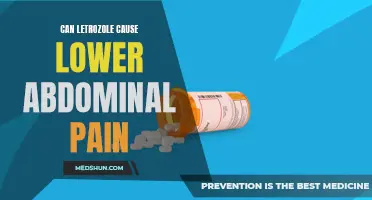
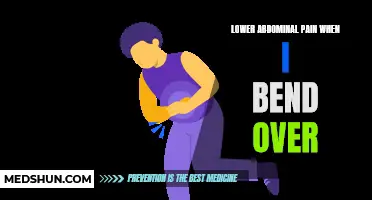
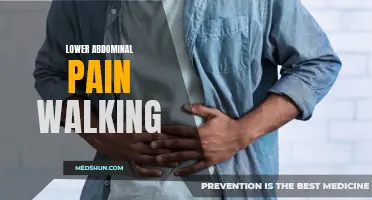
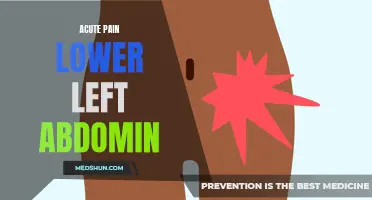

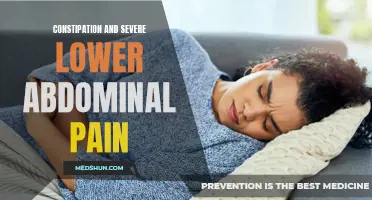
4 Comments
Broderick Hood
Addison Vincent
Finnegan Hickman
Crystell Harty
Author